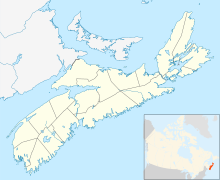Port Hastings, Nova Scotia

Port Hastings is a unincorporated settlement on Cape Breton Island, within the Municipality of the County of Inverness, Canada. The population in 2016 was 89.
The community is located at the eastern end of the Canso Causeway on Cape Breton Island. It is named after Charles Hastings Doyle.[1]
History[]

The community was previously known as Plaster Cove. The Inverness and Richmond Railway was built from coal mines in Inverness to a loading dock at Point Tupper in 1901.[2] The construction of the Canso Causeway which opened in 1955 saw the community become a railway junction after the Truro-Sydney mainline of Canadian National Railways (CNR) was diverted from the railcar ferry terminals at Mulgrave and Point Tupper. The CNR line to Inverness was eventually abandoned in the 1980s, although the Truro-Sydney mainline continues to operate under the Cape Breton and Central Nova Scotia Railway.
The construction of the Canso Causeway also brought what would become the Trans-Canada Highway (Highway 104 and Highway 105) through the community.
A traffic circle named the Port Hastings Rotary creates an important interchange between Highway 104, Highway 105, Trunk 19 and Trunk 4 several hundred metres east of the Canso Canal Bridge.
The growth of automobile-focused tourism following World War II saw several motels and gas stations and a tourist information centre located at the traffic circle.
The community is home to the Port Hastings Museum, which documents local history, including that of the Canso Causeway.
Climate[]
Similar to most of Nova Scotia, Port Hastings has a humid continental climate with some maritime influences, including high snowfall in winter and relatively narrow temperature fluctuations by Canadian standards.
| Climate data for Port Hastings | |||||||||||||
|---|---|---|---|---|---|---|---|---|---|---|---|---|---|
| Month | Jan | Feb | Mar | Apr | May | Jun | Jul | Aug | Sep | Oct | Nov | Dec | Year |
| Record high °C (°F) | 18.3 (64.9) |
16.7 (62.1) |
17.8 (64.0) |
26.7 (80.1) |
31.7 (89.1) |
36.1 (97.0) |
37.2 (99.0) |
32.8 (91.0) |
31 (88) |
29.4 (84.9) |
30 (86) |
20.6 (69.1) |
37.2 (99.0) |
| Average high °C (°F) | −0.9 (30.4) |
−1.6 (29.1) |
2.1 (35.8) |
7 (45) |
13.4 (56.1) |
18.7 (65.7) |
23 (73) |
23 (73) |
18.8 (65.8) |
13.1 (55.6) |
7.3 (45.1) |
2.2 (36.0) |
10.5 (50.9) |
| Average low °C (°F) | −9 (16) |
−9.6 (14.7) |
−5.8 (21.6) |
−0.7 (30.7) |
4 (39) |
9 (48) |
13.4 (56.1) |
13.9 (57.0) |
10.1 (50.2) |
5.2 (41.4) |
0.8 (33.4) |
−5 (23) |
2.2 (36.0) |
| Record low °C (°F) | −26.7 (−16.1) |
−26.1 (−15.0) |
−26.7 (−16.1) |
−13.3 (8.1) |
−6.7 (19.9) |
−2.2 (28.0) |
−0.6 (30.9) |
1.9 (35.4) |
−5.6 (21.9) |
−7.2 (19.0) |
−12.2 (10.0) |
−22.8 (−9.0) |
−26.7 (−16.1) |
| Average precipitation mm (inches) | 147.4 (5.80) |
107.2 (4.22) |
132.3 (5.21) |
142.1 (5.59) |
106.4 (4.19) |
114.2 (4.50) |
90.8 (3.57) |
111.7 (4.40) |
113.6 (4.47) |
143.4 (5.65) |
163.3 (6.43) |
166.2 (6.54) |
1,538.5 (60.57) |
| Source: Environment Canada[3] | |||||||||||||
References[]
- ^ Brown, Thomas J. (1922). "Place-names of the Province of Nova Scotia". archive.org. [Halifax, N.S. Royal Print. & Litho.] Retrieved 21 July 2021.
- ^ Welcome to Inverness, Nova Scotia
- ^ Environment Canada Canadian Climate Normals 1971–2000, accessed 16 July 2009
Coordinates: 45°37��59″N 61°24′00″W / 45.633°N 61.400°W
| Wikivoyage has a travel guide for Port Hastings. |
- Communities in Inverness County, Nova Scotia
- Designated places in Nova Scotia
- General Service Areas in Nova Scotia
